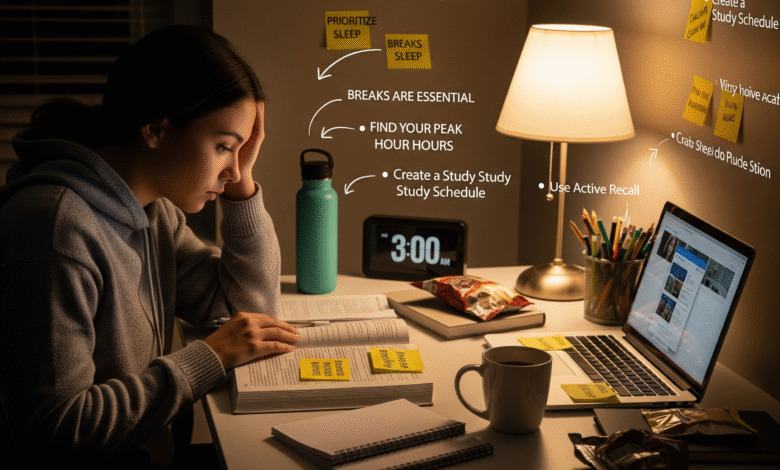
Have you ever found yourself sitting in class after a long study tips for night-shift students, struggling to keep your eyes open while your mind drifts far away from the lesson? You’re not alone. Many students working late hours face the same challenge: balancing studies, work, and sleep without burning out.
The truth is, your body isn’t naturally designed to stay awake at night and sleep during the day. That’s why fatigue, lack of focus, and even poor grades often sneak in. But here’s the good news: with the right habits, you can take back control. This article reveals practical study tips for night-shift students along with 9 powerful secrets to help you rest better, study smarter, and keep your energy steady.
Table of Contents
Why Night-Shift Students Struggle with Sleep and Study
Before jumping into the solutions, it helps to understand what you’re up against:
- Circadian rhythm disruption: Your body clock expects daylight for activity and darkness for rest. Night shifts reverse that pattern.
- Low energy levels: After working all night, your brain feels foggy when it’s time to study.
- Health risks: Chronic lack of sleep leads to stress, anxiety, and weaker focus.
- Time crunch: Balancing work, commuting, and school can leave you with little time for yourself.
Recognizing these struggles is the first step to fixing them.
Essential “Ingredients” for Night-Shift Student Success
Think of your routine like a recipe. The right ingredients make the dish successful. Here are the basics you need:
- Consistent sleep routine → Keeps your body on track.
- Healthy snacks and hydration → Fuels your focus during study hours.
- Dark, quiet room → Improves the quality of your rest.
- Study planner or calendar → Helps you manage time effectively.
- Relaxation methods → Calm your body after a long shift.
Study Tips for Night-Shift Students: 9 Secrets for Better Sleep

1. Build a Consistent Routine
Your body thrives on predictability. Try to go to bed and wake up at the same time, even on days off. This simple change helps regulate your internal clock.
2. Block Out Light and Noise
Daytime distractions make sleep harder. Use blackout curtains, a sleep mask, and earplugs to mimic nighttime conditions. Darkness encourages melatonin, the sleep hormone.
3. Power Down Screens Before Bed
Phones, TVs, and laptops give off blue light that tricks your brain into staying awake. Switch off screens at least 30 minutes before sleep. Instead, unwind with light reading, journaling, or calming music.
4. Keep Your Room Cool
Temperature affects how quickly you fall asleep. Aim for a room between 18–20°C. A cool environment signals your body it’s time to rest.
5. Eat Light, Sleep-Friendly Snacks
Heavy meals late at night keep your system busy. Opt for lighter options like bananas, almonds, or yogurt, which naturally promote better rest.
6. Relax with Mindful Practices
After a long shift, your body is still in “go mode.” Gentle stretching, deep breathing, or sipping herbal tea can help slow your heartbeat and prepare you for rest.
7. Cut Back on Caffeine
Coffee helps you stay awake during work, but it lingers in your system for hours. Steer clear of caffeine for at least six hours before your scheduled bedtime.
8. Nap Smartly
Naps are useful, but timing matters. Keep them short (20–30 minutes) and avoid napping right before your main sleep window. That way, your body still wants a deeper rest later.
9. Move Your Body
Light exercise during the day improves overall energy and helps you sleep more soundly. Even a 15-minute walk after class can make a difference.
How to Build a Healthy Night-Shift Routine (Step-by-Step)
- Finish your shift and avoid heavy meals on the way home.
- Block light and noise in your sleep space.
- Turn off devices at least half an hour before bed.
- Eat a light snack if you’re hungry.
- Practice a short relaxation routine (breathing, stretching).
- Sleep at your scheduled time.
- Wake up refreshed and plan your toughest study tasks for when you feel most alert.
Best Study Planner for Night-Shift Students: 5 Secrets Revealed
Storage and Maintenance of Healthy Habits
Just like leftovers, habits need the right storage:
- Meal prep healthy snacks so you don’t grab fast food after shifts.
- Set reminders on your phone to start winding down.
- Track progress with a sleep diary or study planner.
- Restart quickly if you slip—consistency matters more than perfection.
Variations to Improve Your Study and Sleep Plan

Not every strategy works the same for everyone. Here are alternatives you can try:
- Aromatherapy: Lavender or chamomile can calm your body.
- Study buddy system: Partner with a fellow student who also works shifts.
- AI planners or apps: Automate your schedule to save mental energy.
- Micro-learning: Break lessons into 10–15-minute sessions for easier focus.
Conclusion
Being a night-shift student is not easy, but you’re stronger than you think. By using these study tips for night-shift students and applying the 9 secrets for better sleep, you can turn exhaustion into energy and frustration into focus.
Remember: small, consistent changes build long-term success. The more you treat your routine like a recipe—measuring, adjusting, and refining—the better your results. Start today, and give yourself the chance to study smarter, sleep deeper, and live healthier.
👉 Call to Action: What’s the first tip you’ll try tonight? Share your experience or your own hacks in the comments, and let’s build a stronger night-shift student community together.
Best Study Planner for Night-Shift Students: 5 Secrets Revealed
FAQs on Study Tips for Night-Shift Students
1. What are the best study tips for night-shift students?
The best tips include building a consistent routine, blocking light, and using short naps to restore energy.
2. How much sleep should you aim for as a night-shift student?
Aim for 6–8 hours daily, even if split into smaller blocks.
3. What foods help night-shift students sleep better?
Light snacks like almonds, yogurt, or bananas help your body relax before bed.
4. Should you use a study planner if you work night shifts?
Yes, planners or apps help align your study sessions with your peak energy hours.
5. How do you stay awake during class after working nights?
Stay hydrated, review notes actively, and schedule study time right after rest for maximum focus.



